In Japanese, sukeban スケバン means a "female delinquent," the sort that gets into fights, and is part of gangs.
It's also spelled sukeban 助番, or onna-banchou 女番長 with sukeban as gikun 義訓.
Middle: Reina レーナ
Right: Mavis von Austien メーヴィス・フォン・オースティン
Anime: Watashi, Nouryoku wa Heikinchi de tte Itta yo ne! 私、能力は平均値でって言ったよね! (Episode 10, Stitch)
Definition
The word sukeban means literally "female gang leader," but it's normally used to refer to female delinquents in general, leaders or not.(dic.pixiv.net)
- banchou
番長
Boss of a delinquent group. - onna-banchou
女番長
Female banchou.- onna
女
Woman.
- onna
- sukeban
助番
- suke
助
Slang for "girl."
- suke
- furyou shoujo
不良少女
Delinquent girl.
Apparently, the term originates in the movie series Sukeban 女番長, first aired in 1973.
The term had its boom by the end of the Shouwa 昭和 era, in the 70's and 80's.(gendai.ismedia.jp)
Appearance
Not every female delinquent is a sukeban. If a girl wears:
- A black or dark sailor uniform.
- seeraa-fuku
セーラー服
"Sailor clothes." The term for the uniform worn by Japanese middle and high school girls that's based on the uniform worn by sailors from the west.
- seeraa-fuku
- A long skirt.
- ron-tai
ロンタイ - rongu taito sukaato
ロングタイトスカート
Long tight skirt.
- ron-tai
- A white mask.
- A sarashi さらし around her chest.
That's a sukeban. A female delinquent that probably insults a guy's manhood while burying into his face a bamboo sword used in the practice of Kendō 剣道.
Anime: Kirarin☆Revolution, きらりん☆レボリューション (Episode 47)
- Context: Erina changes her appearance into a sukeban, in order to scare her rival.
Middle: Reina レーナ
Right: Mavis von Austien メーヴィス・フォン・オースティン
Anime: Watashi, Nouryoku wa Heikinchi de tte Itta yo ne! 私、能力は平均値でって言ったよね! (Episode 10, Stitch)
- Context: Mile マイル imagines Pauline and Reina wearing sukeban outfits, Mavis wearing a male yankii ヤンキー outfit, forming a gang, and one of them hitting her in the face. After which Reina says:
- kao wa yame na, bodhi ni shi na
顔はやめな、ボディにしな
Stop [with] the face, make [it] the body. (literally.)
Don't hit her face, aim for the body. (i.e. torso, limbs, etc.)- This is a reference to the TV drama San-nen Bii-gumi Kinpachi-sensei 3年B組金八先生, which began airing in 1979, in which the actress Mihara Junko 三原じゅん子 says:(gendai.ismedia.jp)
- kao wa yabai yo, bodhi yan-na, bodhi wo
顔はやばいよ、ボディやんな、ボディを
[Hitting] the face is bad, [hit] the body, the body.- yan-na - contraction of yari na やりな.
However, if a girl wears:
- Bright accessories.
- A mini skirt.
- Heavy makeup.
- Colored hair meshes.
That's not a sukeban. That's a gyaru ギャル, which are stereotypically associated with being promiscuous rather than being fighters, so they may be delinquents, and hang with delinquents, but they typically don't do any violent stuff.
- Context: gyaru Mai-nyun まいにゅん unleashes her ultimate technique on sukeban Kamio Yui 神緒ゆい.
- yankii gyaru ougi
ヤンキーギャル奥義
Delinquent gal secret technique. - maji-manji-gatame
マジ卍固め
Serious swastika hold.- maji-manji
マジ卍
(a slang vaguely meaning something is intense.) - manji-gatame
卍固め
Swastika hold. (literally.)
Octopus hold. (English name for the same wrestling technique.) - This is the skill that Mai-nyun acquired after arduous training as a gyaru. Don't ask me what in the world that training was. I have absolutely no idea.
- Unlike the normal manji-gatame, which targets only a few vital spots, the maji-manji-gatame targets 109 vital spots, according to the manga.
- This number, 109, pronounced maru-kyuu, literally "circle nine," with "circle" being a way to say "zero" when spelling out numbers, is in reference to the iconic department store in Shibuya 渋谷, the Ichi-maru-kyuu 109, which is a tower with a red 109 written on it.
- maji-manji
Long Skirt
Typically, a sukeban will wear a skirt at least long enough to cover her knees, which looks rather odd, since pretty much every other high school girl you see in anime wears an above knee skirt or mini skirt instead.
Anime: Persona 4, ペルソナ4 (Episode 19, Stitch)
- Context: Narukami crossdresses in a sukeban outfit.
- On Pixiv, this design is tagged suke-banchou スケ番長.
The reason for this is simply due to the fact that sukeban had its boom in the 70's and 80's.
At the time, high school girls wore longer skirts, so the sukeban of the time weren't wearing a skirt particularly long, they were just wearing the same skirt everybody else was wearing.
Anime: Sukeban Deka スケバン刑事 (Episode 2, OVA)
- Context: in this 1991 anime adaptation of a manga first published in 1975, all girls have the sukeban look because that's literally the school uniform.
- ashi-kumi
足組み
Legs-crossing. To have one's legs crossed.
A 90's style called ko-gyaru コギャル, "school gyaru," even included wearing a mini skirt because normally a girl wouldn't wear one, and some schools might have had uniform rules against wearing skirts that short.
Nowadays, wearing a mini skirt in high school is more common, so a character wearing a long skirt can be a hint they're a sukeban.
Note, however, that not all sukeban wear long skirts. Being a sukeban is about being a female delinquent that acts tough. It's not about wearing clothes.
Anime: Kill la Kill, キルラキル (Episode 3, Stitch)
- Context: Ryuuko is a micro skirt-wearing sukeban.
Some don't even wear skirts.
Anime: Ookami-san to Shichinin no Nakama-tachi オオカミさんと七人の仲間たち (Episode 1)
- Context:
Chun Li 春麗 in her high school delinquent years.
Tough Girl
Being a sukeban has nothing to do with appearance, it has to do with being a female:
- tsuppari
ツッパリ
"Tough guy." In the sense of someone who acts tough and forceful.
Every trope that applies to delinquents who act tough, staring at anyone who seems to look down on them, applies to the sukeban.
Anime: Zombieland Saga, ゾンビランドサガ (Episode 9)
- Context: what did you just say to me?
- !?
The interrobang is a symbol associated with old delinquents' manga.
- !?
Typically, a sukeban is strong enough to defeat a male delinquent in a fight, which means they also fall in another type of character:
- otoko-masari
男勝り
Man-besting. In the sense of a girl that can beat a guy in a fight.- masaru
勝る
To best. To win against.
- masaru
Ladies
There's a term for a female "biker gang," bouzousoku 暴走族, it's "ladies," redhiisu レディース.
Left: Tanimura Chiaki 谷村千秋
Right: Oomori Nene 大森寧々
Anime: Beelzebub, べるぜバブ (Episode 8, Stitch)
- Context: three members of the ladies Red Tail, 烈怒帝瑠.
- The spelling re'-do-tei-ru 烈怒帝瑠 is an ateji.
Left: Kuurubiyuutei Gankyou 空琉美遊亭丸京
Center: Buratei Marii 蕪羅亭魔梨威
Right: Bouhatei Tetora 防波亭手寅
Rightmost: Haroukitei Kigurumi 波浪浮亭木胡桃
Anime: Joshiraku じょしらく (Episode 7)
- Context: girls suddenly turn into delinquents.
- tokkou-fuku
特攻服
"Special attack clothes." Long jackets worn by biker gangs, typically with text written on the back.
Anime: Gabriel DropOut, ガヴリールドロップアウト (Episode 7, Stitch)
- Context: a delinquent Vignette sits in the so-called "delinquent squat" position.
- See also: yankii-zuwari ヤンキー座り.
References
- 昭和の「スケバン」文化を語ろう!女番長はある種の最先端だった - gendai.ismedia.jp, accessed 2021-04-09.
- スケバン - dic.pixiv.net, accessed 2021-04-09.
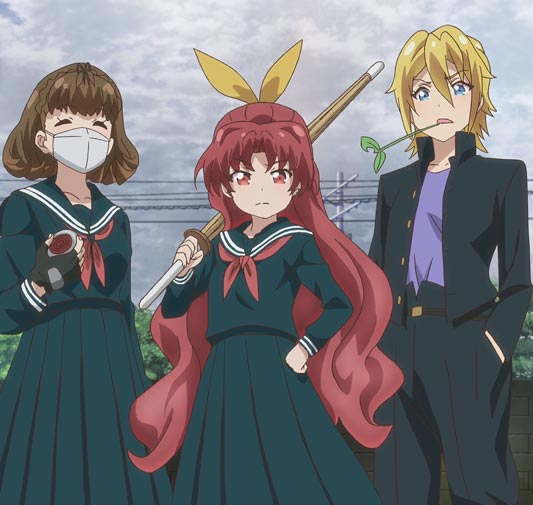
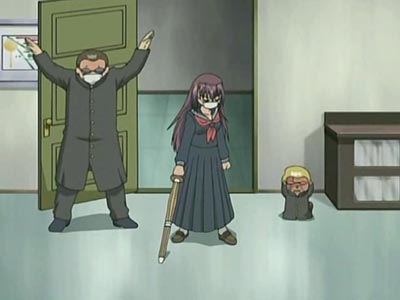
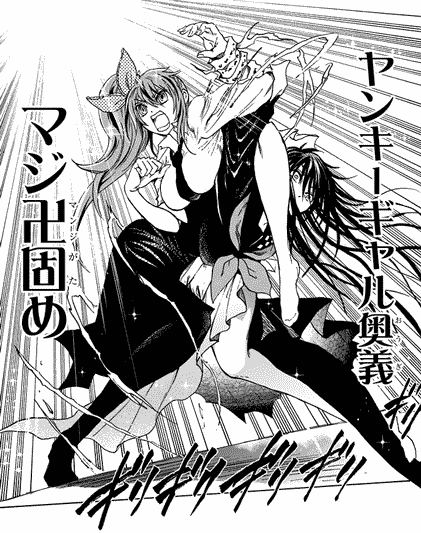
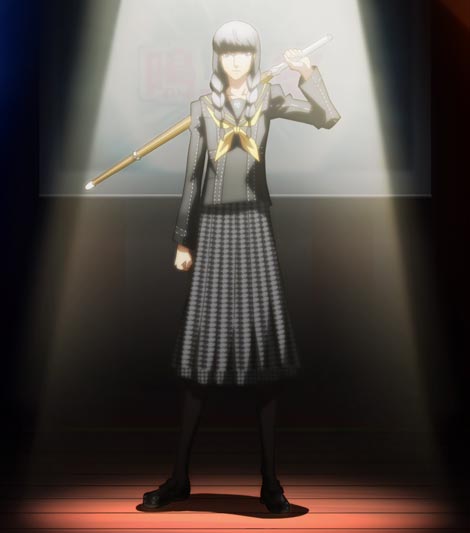
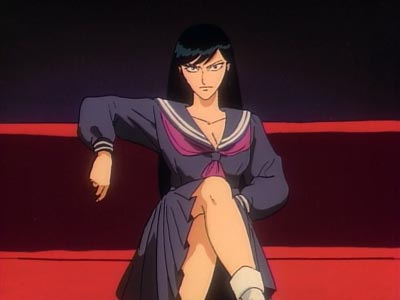
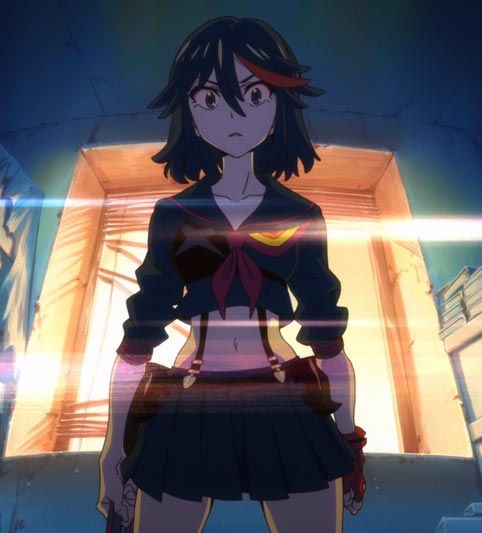
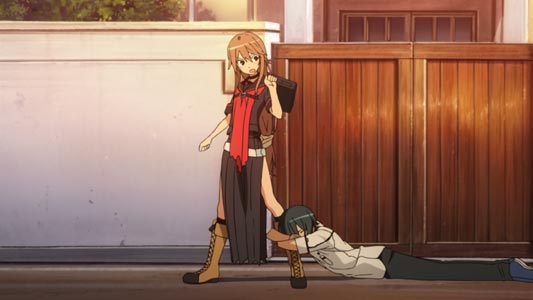
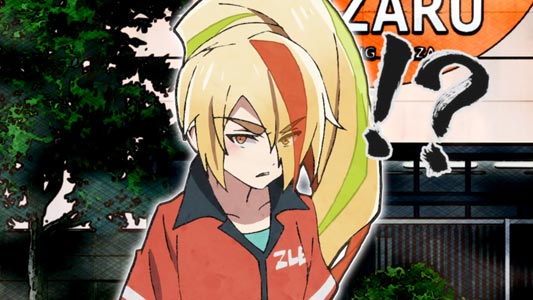
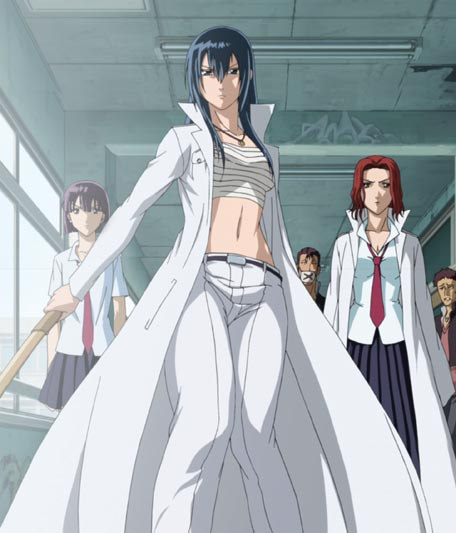
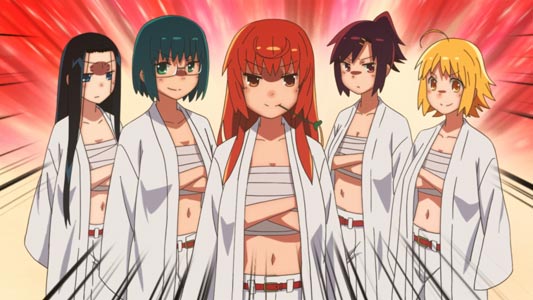
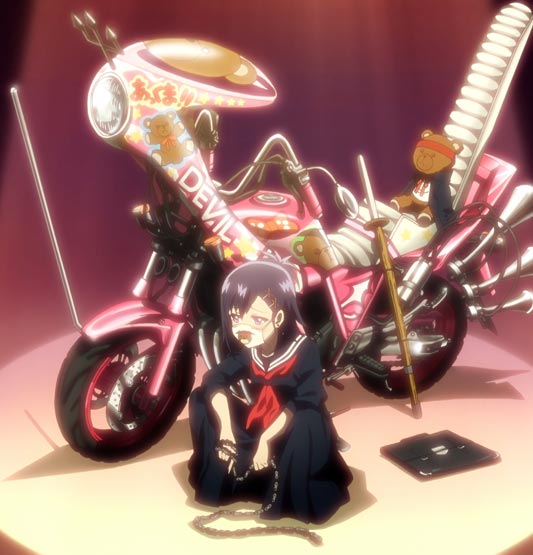
No comments: